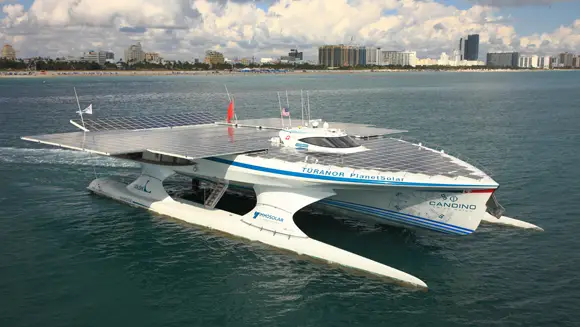
MS Tûranor PlanetSolar, the world's largest solar-powered boat, today completed an incredible round-the-world journey which has earned the catamaran and its crew a total of five world records.
Having begun its voyage in September 2010 with a mission to promote renewable energy, the vessel docked at Hercule Harbor in Monaco this afternoon to end its epic journey and become the first solar-powered boat to circumnavigate the globe.
As well as setting a new record for the longest journey by solar-powered boat, the project has also seen the catamaran claim Guinness World Record titles for the fastest crossing of the Atlantic by solar power and the fastest crossing of the South China Sea by solar power.
Measuring 31-metres in length and featuring 537 square metres of black solar panels mounted around its raised cockpit, the boat sailed more than 60'000 km during its 19-month adventure, travelling over every ocean and continent using only photovoltaic energy.
As well as passing through the Panama and Suez canals, the boat also made stop-offs in 28 countries including Mexico, Australia, Singapore and Abu Dhabi, with the breaks used to promote the use of solar energy at local events.
Swiss electrical engineer Raphael Domjan was inspired to start the project nine years ago after seeing the effects of climate change on an Icelandic glacier.
Speaking to AFP-TV ahead of the final leg of the journey, Domjan explained: "The idea was not to perform a feat but an eco-adventure with the aim of passing on the message that change is possible".
"We have everything at our disposal: the know-how, technology, raw materials and renewable energy to become sustainable and protect the planet".
Designed and constructed over a period of two years, MS Tûranor PlanetSolar cost a total of 15 million euros to build following funding by a number of sponsors and private partners.
Festivities celebrating the boat's arrival are set to continue throughout the night in Monaco, with a light show and a concert by Swiss band Sonalp both being powered in suitable fashion by the energy stored in the craft's batteries.
